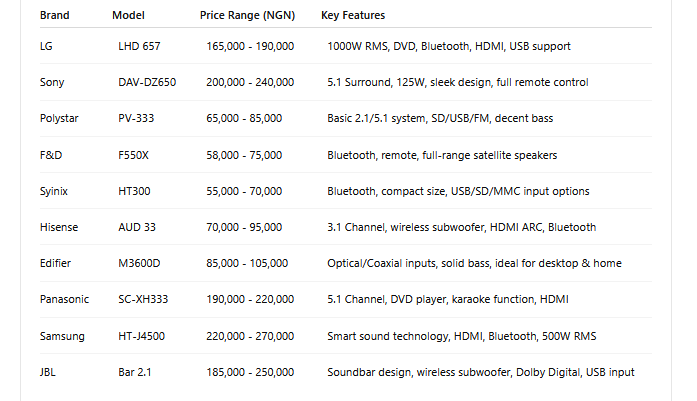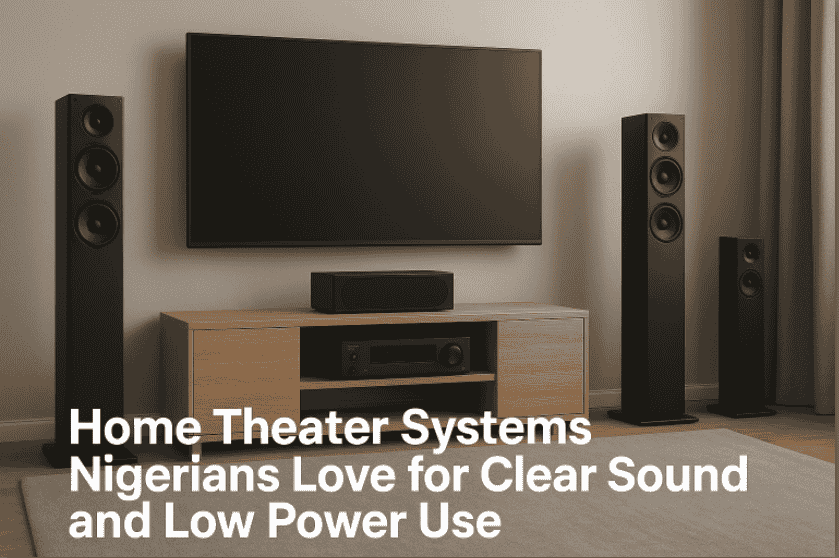In today’s Nigeria, where frequent power outages and rising electricity tariffs are part of everyday life, investing in a home theater system that delivers premium sound without consuming too much power is no longer a luxury—it’s a necessity. From Lagos to Kaduna, Nigerians are transforming their living rooms into mini cinemas without breaking the bank or spiking their NEPA bills.
But here’s the problem: many buyers end up with bulky systems that either consume too much power or fail to deliver the audio quality they hoped for. This comprehensive guide addresses this pain point.
In this article, we’ll explore the best home theater systems that strike a balance between clear sound and low energy use, all while keeping local buying preferences, power constraints, and budget limitations in mind. We’ll also share a home theater setup guide, budget tips, and specific models loved by Nigerians. Let’s dive in.
While exploring the best-loved home theater systems in Nigeria—known for their crisp audio and low power consumption—you may also find it valuable to learn about estate management in the country. This comprehensive guide covers key insights on property valuation, tenant relations, legal documentation, and smart strategies to avoid costly mistakes in Nigeria’s real estate sector.
Why Nigerians Are Investing in Compact, Power-Saving Home Theater Systems
It’s common to walk into a Nigerian home and see a towering sound system proudly positioned in the living room—sometimes even bigger than the television itself. These “audio shrines” have long been status symbols. But times have changed, and so has the thinking of the average Nigerian consumer.
With tougher economic realities, inconsistent electricity, rising fuel prices, and the surge of home-based digital entertainment, Nigerians are now prioritizing smaller, more efficient, and smart home theater systems that deliver quality sound without draining their pockets—or their power supply.
1. Unreliable Power Supply (PHCN Challenges)
Let’s face it—PHCN (Power Holding Company of Nigeria) is not consistent. Especially in regions like Aba, Ilorin, Jos, and some parts of Lagos mainland, power cuts are frequent, long-lasting, and frustrating. Running a bulky, high-wattage home theater system becomes nearly impossible without a generator.
That’s why power-saving systems (under 100 watts) with low voltage support and surge protection have become essential. They allow users to enjoy quality sound on limited power without fear of frying their gadgets.
2. Skyrocketing Fuel Prices and Generator Costs
As fuel prices continue to spike, many families are running generators only during essential hours—mostly for lighting and maybe a fan or fridge. Running a 1000W sound system just to watch a movie or play music becomes an expensive luxury.
This has led to the growing demand for compact Bluetooth home theater systems and portable speakers that can operate on inverters or rechargeable batteries, drastically cutting down on fuel usage while still offering satisfying sound.
3. Rise of Home Streaming (Netflix, YouTube, Showmax, etc.)
With the explosion of platforms like Netflix, YouTube, Showmax, and Prime Video, Nigerians are increasingly consuming content at home—especially in cities with reliable internet. Young families and single youths in urban centers are setting up mini cinemas in their living rooms.
What they need isn’t a massive DJ-style speaker set, but rather a smart, energy-efficient, wall-mountable system that can connect via Bluetooth, HDMI ARC, or USB, and still deliver deep bass and crisp dialogue.
4. Energy-Efficient Living is Now a Trend
Thanks to tech awareness and rising electricity tariffs, more Nigerians are now energy-conscious. From solar-powered fans to low-wattage bulbs and energy-saving TVs, the same logic applies to sound systems.
Compact home theater systems with Energy Star certification and automatic power-off functions are flying off the shelves, especially in urban tech markets like Computer Village (Lagos), Alaba International Market, and Wuse Market (Abuja).
5. Smaller Size, Bigger Value
Bigger doesn’t always mean better. Many new systems deliver powerful audio in sleek, compact designs that don’t clutter the room or drain the inverter. Brands like LG, F&D, Syinix, and Zealot are now manufacturing 2.1 and 5.1 channel systems optimized for small to medium-sized homes.
They offer:
• Crystal-clear treble and bass balance
• Bluetooth music streaming from mobile phones
• Compatibility with USB drives, SD cards, FM radio, and TVs
• Power-saving standby mode and remote control access
6. Affordability Meets Performance
It’s no longer about showing off giant woofers—it’s about getting the most value at the lowest power cost. These compact systems range from ₦30,000 to ₦90,000, making them affordable for students, low-income earners, and small families.
And because they’re easier to maintain, they come with fewer repair headaches and longer product life when compared to bulky systems that overheat or break down due to unstable power.
7. Changing Lifestyle, Changing Audio Needs
Nigerians are moving away from the “loud is better” mentality. With the rise of apartment living, neighbors and landlords now discourage excessive noise. Compact systems allow you to enjoy rich audio privately without disturbing the entire compound.
Plus, with more people working from home or studying online, clear sound output at low volume levels is becoming a must-have.
If you’re planning to upgrade or buy a sound system in Nigeria today, make sure it matches your power supply reality, budget, and entertainment habits. Bigger isn’t always better. Smart is better.
Best Home Theater Brands Nigerians Trust for Clear Sound
Every Nigerian knows that not all electronics brands are created equal. Whether you’re chilling in a Lagos apartment, setting up a living room in Benin, or throwing a party in Enugu, clear sound and low energy usage are top priorities when choosing a home theater system. Below are the top home theater brands Nigerians trust, along with their power ratings, unique selling points, and best models available in the local market.
1. LG
LG is one of the most trusted electronics brands in Nigeria. Their home theater systems are known for deep bass, sharp treble, and impressive energy efficiency.
• Top Pick: LG LHD 657 (1000W RMS)
• Power Rating: 100–200 watts
• Selling Point: Durable, excellent sound clarity, supports DVD, USB, HDMI, Bluetooth
• Why Nigerians Love It: Easy to maintain, widely available, great for music and movies
2. Sony
Sony may be a premium brand, but it’s a go-to for Nigerians who want high-quality surround sound and long-lasting components.
• Top Pick: Sony DAV-DZ650
• Power Rating: 125 watts
• Selling Point: Sleek design, immersive 5.1 channel audio
• Why Nigerians Love It: Fantastic for cinematic experiences, strong bass
3. Polystar
Polystar is a budget-friendly favorite, especially among students and low-income families. It offers decent performance at a pocket-friendly price.
• Top Pick: Polystar PV-333
• Power Rating: 80–100 watts
• Selling Point: Affordable with decent bass
• Why Nigerians Love It: Local support, good enough for small rooms or hostel use
4. F&D (Fenda Audio)
F&D caters well to gamers and small apartment users looking for compact and efficient sound systems.
• Top Pick: F&D F550X
• Power Rating: 65 watts
• Selling Point: Compact, wireless Bluetooth connectivity
• Why Nigerians Love It: Stylish look, portable, value for money
5. Syinix
A relatively new brand in Nigeria but quickly gaining popularity for combining performance and affordability.
• Top Pick: Syinix HT300
• Power Rating: 90 watts
• Selling Point: Bluetooth, USB, and crystal-clear vocals
• Why Nigerians Love It: Sleek, affordable, and practical for mid-sized living rooms
6. Hisense
Hisense has carved a niche in Nigeria’s electronics space with smart TVs and audio systems known for durability and sound fidelity.
• Top Pick: Hisense AUD 600
• Power Rating: 120 watts
• Selling Point: Deep surround bass, ARC & optical input, Bluetooth 5.0
• Why Nigerians Love It: Stylish, reliable, perfect match with Hisense TVs
7. Panasonic
Though not as mainstream as LG or Sony in Nigeria, Panasonic offers top-tier audio quality and is great for audiophiles.
• Top Pick: Panasonic SC-XH166
• Power Rating: 120–150 watts
• Selling Point: Rich audio detail and crystal-clear dialogues
• Why Nigerians Love It: Long-lasting and great for detailed sound playback
8. JBL
JBL is globally known for high-end speakers and sound systems. Nigerians who want premium audio for music events or home use consider JBL a great investment.
• Top Pick: JBL Bar 5.1
• Power Rating: 150 watts
• Selling Point: Detachable speakers, Dolby Digital, wireless subwoofer
• Why Nigerians Love It: Great for events, parties, and large living spaces
9. Samsung
Samsung isn’t just about TVs and phones—its home theater systems offer sleek design and top-quality audio integration.
• Top Pick: Samsung HT-J4500
• Power Rating: 100–150 watts
• Selling Point: HDMI ARC, DVD upscaling, Dolby Digital
• Why Nigerians Love It: Premium design, synced well with Samsung TVs
10. Zealot
Zealot is popular among the youth for its affordable mini home theater systems and portable Bluetooth speakers.
• Top Pick: Zealot S32
• Power Rating: 40–60 watts
• Selling Point: Rechargeable, Bluetooth-enabled, compact
• Why Nigerians Love It: Easy to move around, suitable for bedrooms and hostels
11. Binatone
Binatone is a trusted name in Nigerian households. While mostly known for kitchen appliances, their sound systems are simple, budget-friendly, and functional.
• Top Pick: Binatone BA-300
• Power Rating: 70 watts
• Selling Point: FM radio, USB, SD card, Bluetooth
• Why Nigerians Love It: Reliable after-sales support and very affordable
12. Kenwood
Kenwood delivers premium audio experiences, mostly for users who are passionate about high-fidelity sound.
• Top Pick: Kenwood K-531
• Power Rating: 140 watts
• Selling Point: Audiophile-grade clarity, robust build
• Why Nigerians Love It: Powerful sound for large rooms and events
Features Nigerians Should Look for in a Low Power Home Theater System
Before you head to Alaba Market or check online listings, here are essential features to prioritize if you want a home theater system that fits the Nigerian lifestyle:
• Power Rating: Look for systems under 200 watts to ensure minimal strain on generators or inverters. Ideal for areas with unstable electricity.
• Energy Star Certification: Devices with this certification are optimized for energy efficiency, helping reduce monthly power bills.
• Bluetooth Connectivity: Avoid tangled wires by choosing a Bluetooth home theater system that lets you stream from your phone, laptop, or smart TV.
• USB Playback: A must-have for Nigerians who enjoy watching content from flash drives. It allows easy plug-and-play functionality for movies and MP3s.
• Wall Mountable Speakers: This is especially crucial in home theater for small rooms. Wall mounting frees up floor space, keeps the setup tidy, and enhances sound projection.
• Multi-Format Support: Look for support for formats like DVD, MP4, MP3, AVI, and HDMI for broader compatibility.
• Bass & Treble Control: Ability to manually adjust audio tones to suit music, film, or worship sessions.
• Built-In Radio: Many Nigerians still appreciate FM radio for news and gospel programs, making this feature handy.
• Remote Control & Display Panel: Ease of use is vital. Choose a system with intuitive controls and a digital display.
These specs are especially important when buying for small apartments or self-contained rooms, common among students, tenants, and bachelors in cities like Abuja, Owerri, Enugu, or Ibadan. Prioritizing these features ensures you get the best value in terms of sound clarity, energy use, and space-saving efficiency.
Avoid buying purely based on loudness; focus instead on clarity, power efficiency, and build quality. A well-balanced system often sounds better than a loud but distorted one.
Affordable Home Theater Price in Nigeria (2025 Update)
Thanks to fluctuating exchange rates and import duties, home theater price Nigeria continues to shift unpredictably. Still, it is possible to get a powerful yet affordable system that fits your budget and space. Below is an updated price guide that reflects the average retail value of popular brands commonly available across Nigeria:

Prices may vary depending on location, seller, and seasonal demand. Retail platforms like Jumia, Konga, and Slot often run promos. For physical stores, places like Alaba International Market (Lagos), Wuse Market (Abuja), and Ibadan Electronics Market remain go-to hubs.
Pro Tips Before Buying:
• Always request a live sound test before purchasing in-store.
• Verify for genuine warranty cards or manufacturer seals.
• Use platforms with buyer protection policies when shopping online.
• Confirm product authenticity via barcode scanning apps or the brand’s official website.
This updated section will help Nigerians make informed buying decisions while keeping sound quality and energy usage in mind.
Home Theater for Small Rooms: Tips for Nigerians Living in Tight Spaces
Not everyone has a duplex in Lekki or GRA. For students and young professionals in mini-flats or boys’ quarters:
• Use cheap home theater speakers with portable subwoofers
• Pick wireless or Bluetooth options to avoid cable mess
• Mount your TV and front speakers to save space
• Add thick curtains to enhance acoustics and block outside noise
• Choose 2.1 or 3.1 channel systems over full 5.1/7.1 setups for compact areas
• Opt for systems with small satellite speakers you can easily fit on shelves
• Place the subwoofer near a wall corner to amplify bass without increasing volume
• If renting, use removable adhesive hooks or shelves to avoid drilling
For those living in power-challenged areas, consider systems with energy-saving modes or compatibility with low-wattage inverters. Brands like F&D, Syinix, and Polystar offer compact units well-suited for these environments.
How to Spot Fake Home Theater Systems in Nigerian Markets
Sadly, the Nigerian electronics market is flooded with substandard and counterfeit home theater systems, especially in busy tech hubs like Alaba International Market in Lagos, Computer Village Ikeja, and local electronics shops across cities like Onitsha, Abuja, Port Harcourt, and Kano. Unsuspecting buyers often fall prey to flashy designs and persuasive sellers pushing fake or refurbished systems disguised as original.
Here are smart and practical ways to identify a fake home theater system before parting with your money:
• Check the Brand Spelling and Logo Carefully
Counterfeit products often copy popular brand names but make subtle spelling errors. Examples include:
i. “Sorny” instead of Sony
ii. “Panaphonics” instead of Panasonic
iii. “LGG” or “Samsong” instead of LG or Samsung
Also, examine the logo. If it looks blurry, off-centered, or suspiciously different from the known original, it’s likely fake.
• Ask for Official Warranty or Receipt
Genuine brands usually offer 6–12 months warranty with a verifiable receipt that includes the serial number. If the seller hesitates or says, “Na original, no worry,” but refuses to provide a receipt or warranty, be cautious.
Confirm if there’s a Nigerian customer service center for after-sales support. Reputable brands like LG, Samsung, and Hisense have service centers across major cities.
• Do an Audio Performance Test (Not Just Volume!)
Don’t be fooled by loud volume alone. Run a quick test with music and movie dialogue to check:
i. Bass Response – Does it sound rich or just noisy?
ii. Treble Clarity – Are vocals crisp or muffled?
iii. Balance at Low and High Volume – Do the speakers distort when loud or go too flat when quiet?
Genuine systems maintain clarity and balance across all volume levels.
• Inspect the Packaging Thoroughly
Original home theaters usually come in well-sealed, high-quality branded boxes with:
i. Proper labeling (model number, features, wattage)
ii. Serial numbers on the box matching the one on the device
iii. Instruction manuals in good English (not bad grammar)
If the box looks worn out, poorly printed, or lacks key information, it could be fake or refurbished.
• Examine the Build Quality and Finishing
Feel the materials. Original systems are made of solid, durable plastic or metal. Watch out for:
i. Loose knobs or buttons
ii. Lightweight, fragile speakers
iii. Shabby remote control or poor finishing
Genuine brands are usually heavier due to high-quality components.
• Verify Product Specs Online Before Buying
Before you buy, Google the exact model number written on the system. Check if the specs match the brand’s official website or trusted platforms like Jumia, Konga, Amazon, or the manufacturer’s site. Fake products often display exaggerated specs (e.g., “20,000W PMPO”) that don’t exist in real systems.
• Avoid “Too Good to Be True” Prices
If the price sounds too cheap to be real, it probably is. Be wary of sellers offering high-end brands like Bose, JBL, Sony, or LG for half their normal price. Fake sellers often lure buyers with low prices and end up supplying substandard audio equipment.
• Buy from Trusted Dealers or Certified Outlets
Whenever possible, buy from:
i. Authorized dealers
ii. Brand-certified showrooms
iii. Reputable e-commerce platforms
Avoid random roadside sellers or open-market shops with no verifiable business address or name.
• Check for Product Registration or Anti-Counterfeit Stickers
Some genuine products in Nigeria come with NCC, SONCAP, or QR-code verification labels. Scratch and scan where applicable to verify authenticity.
Counterfeit electronics may look flashy but often break down quickly, lack warranty support, and provide poor performance. Always do your homework before buying any audio equipment in Nigeria — especially in open markets.
Better safe than sorry. If in doubt, don’t buy.
In addition to reading about the Home Theater Systems Nigerians Love for Clear Sound and Low Power Use, it will interest to also read to discover the newest bridal train styles trending among Nigerian bridesmaids. From lace and satin to bold colors and corset fits, explore the must-have looks for weddings this year and how to style them with elegance.
Maintenance Tips to Make Your Home Theater Last Longer
Buying a home theater system—whether budget-friendly or premium—is a solid investment in your entertainment experience. But in Nigeria, where unstable power supply, dusty environments, and erratic generator usage are common, proper maintenance is key to making your system last.
Here are practical and easy-to-follow maintenance tips that will help even cheap home theater speakers deliver excellent performance for years:
• Always Use a Voltage Regulator or Stabilizer
Power fluctuations from NEPA/PHCN can fry sensitive electronics. Always connect your system to a voltage regulator or AVR (Automatic Voltage Regulator) to protect it from:
i. Power surges
ii. Low voltage
iii. Sudden blackouts
If you have the budget, invest in a UPS (Uninterruptible Power Supply) for additional protection and peace of mind.
• Don’t Plug Directly into the Wall – Especially on Generator Power
When running your generator, avoid plugging your home theater directly into the wall socket. Voltage output from many generators can spike or drop suddenly, especially when other appliances are in use.
Solution: Use a stabilizer with surge protection or a generator-compatible inverter setup to regulate power.
• Clean Speaker Vents and Surfaces Monthly
Dust is a silent killer of electronics, especially in cities like Abuja, Kano, or Sokoto with dry and dusty seasons. Use a soft brush or dry microfiber cloth to clean:
i. Speaker grills
ii. Cooling vents
iii. Ports and remote control sensors
iv. Avoid using wet cloths or spraying liquids directly on the speakers.
• Avoid Playing at Maximum Volume Regularly
Blasting your system at full volume every day may feel good—but it slowly damages:
i. Internal speaker coils
ii. Tweeters and subwoofer diaphragms
iii. Amplifier components
Try to keep the volume below 75% for regular use, and only push higher briefly when necessary.
• Turn Off Completely When Not in Use
Many users leave their systems on standby mode, especially if the remote has a power button. However, true power-off helps reduce heat buildup and extends internal component life.
Use the main power switch or unplug if you won’t be using it for a while—especially during thunderstorms or when you’ll be away for days.
• Keep Away from Moisture and Heat Sources
Avoid placing your home theater system near:
i. Windows (rainwater can splash in)
ii. Kitchens (steam and oil in the air)
iii. Gas cylinders or cooking areas
iv. Direct sunlight
High humidity or heat can warp circuits, damage speaker cones, and cause short circuits.
• Use the Right Cables and Don’t Overstretch Wires
Avoid cheap audio cables that easily fray or deliver poor sound signals. Also:
i. Don’t twist or force HDMI and RCA cables
ii. Avoid stepping on or bending speaker wires
iii. Use cable organizers to keep things tidy
This prevents damage to ports and ensures high-quality audio transmission.
• Run the System Occasionally (Even If Not in Use Often)
Like a car, electronics need to be powered on and run occasionally. If you don’t use your home theater often, switch it on and play something for a few minutes weekly. This keeps internal components active and prevents stiffening or degradation of capacitors and moving parts.
• Use a Remote Control Cover and Clean Hands
Sticky fingers, oil, or palm sweat can quickly wear out your remote buttons. Use a protective silicone cover or handle with clean hands. Wipe it down gently with a dry cloth.
• Update or Check Firmware (For Smart Systems)
If you use a smart home theater system (e.g., LG Sound Bar with WiFi/Bluetooth, Sony 5.1 Smart System), check for firmware updates from the brand’s official site to fix bugs, improve sound quality, or unlock new features.
Even the most expensive sound system won’t last long in Nigeria without proper care. But with these simple maintenance habits—like using voltage protection, cleaning regularly, and turning off when not in use—you can enjoy cinema-quality sound at home for years.
Treat your home theater system like your phone or car—regular maintenance equals longer life.
In Conclusion: For millions of Nigerians, a reliable home theater system is more than just a luxury; it’s a vital part of everyday life. Whether you’re catching up on Nollywood films, enjoying a worship session, or watching the Premier League, choosing the right sound system makes all the difference.
By focusing on clear sound, low power use, and budget-friendly options, you can enjoy entertainment the Nigerian way—without worrying about high bills or weak audio. From trusted brands like LG and Sony to budget picks like Polystar and Syinix, there’s something for everyone.
So, next time you’re shopping for a new system, remember: sound sharp, spend smart.
Frequently Asked Questions (FAQs)
1. What is the best home theater system for Nigerian homes?
LG and Sony are among the best for clear sound and durability, though brands like F&D and Polystar offer great value.
2. How much is a good home theater in Nigeria?
Expect to pay between ₦50,000 and ₦200,000 depending on the brand and features.
3. Can a home theater run on generator or inverter?
Yes, choose systems with power ratings below 200 watts for better compatibility.
4. Are Bluetooth home theaters reliable?
Absolutely. They offer wireless convenience and are popular in Nigeria for mobile streaming.
5. Where can I buy original home theater systems in Nigeria?
Reputable online platforms like Jumia and Konga or electronics markets like Alaba.
6. What should I avoid when buying a home theater in Nigeria?
Avoid unbranded systems with no warranty or support. Check for spelling errors and test the sound quality.
7. How can I set up a home theater in a small room?
Use wall-mounted speakers, compact subs, and avoid large furniture clutter.
8. Are there cheap home theater speakers with good quality?
Yes. Brands like Syinix, F&D, and Polystar offer budget systems with decent sound.
9. Do I need a stabilizer for my home theater?
Yes. This protects your system from power surges, especially in Nigeria.
10. Can I use my home theater with a smart TV?
Yes. Use HDMI or Bluetooth to connect for best results.
11. Why is my home theater sound low despite high volume?
Could be poor placement or a faulty amplifier. Try reconfiguring speaker positions.
12. Is it okay to leave my home theater plugged in?
It’s best to unplug or use a surge protector when not in use.
13. Which home theater brand offers the best warranty in Nigeria?
LG and Sony often provide 1-year manufacturer warranty with service centers across major cities.
Need more tech-buying tips for Nigerian homes? Stay tuned to SocialMediaForums.com.ng – your reliable voice in the Nigerian tech scene.
Now that you have found out the Top Home Theater Systems Nigerians Choose for Clear Sound and Energy Efficiency, find time to also find out Why Electric Ant Are Invading Nigerian Homes! Learn how to identify them, the dangers they pose, and practical steps every homeowner should take to protect their property from these aggressive and harmful pests.





